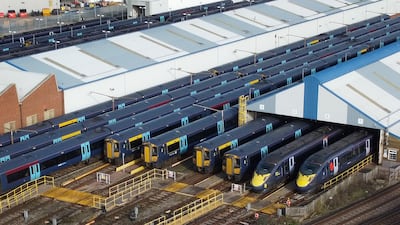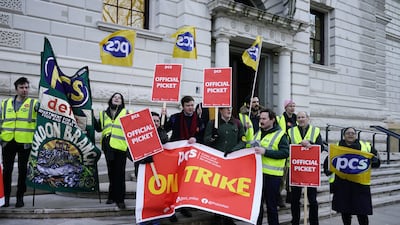Britain's worst day of strikes in more than a decade has begun, with teachers, train drivers, civil servants and university lecturers among those walking out on Wednesday.
Up to 500,000 workers will stage industrial action, prompting UK Prime Minister Rishi Sunak to warn the day will be “very difficult”.
Passport control officers, bus drivers and security guards will also strike in action that will coincide with wider protests against government plans for a new law on minimum service levels during strikes.
Unions have called it the “anti-strike bill”, saying it could lead to workers who legally vote to strike being sacked.
The strikes will force a temporary return to lockdown-style homeschooling, as estimates suggest the vast majority of schools in England and Wales have been affected.
Dr Mary Bousted, joint general secretary of the National Education Union, told the BBC: "About 85 per cent of schools will be affected - either fully closed or partially closed - today."
She called the teachers' walkout “very unfortunate” and said she would “very much regret” that parents will be inconvenienced and possibly lose money due to the closures.
“We would not be here if the government showed any intention to negotiate, she said.
“No teacher wants to be away from their class.
“But I would also say that it’s really important that teachers stand up now, because the situation in schools is becoming untenable. And that in the long term, and indeed in the present, is affecting the education of their pupils profoundly.”
Asked whether she respected the position of teachers who refused to strike, given what happened to children during the pandemic, she said: “Of course. Unions can’t compel members and indeed there are many teachers who are not members of the NEU, and we can’t compel them to go on strike.
“All we can do is say we are trying to do the best we can to negotiate with this government so you don’t have to go on strike.”
Education Secretary Gillian Keegan said she “disappointed” that the strike by teachers in England and Wales was going ahead.
Ms Keegan told Times Radio the industrial action was unnecessary as discussions with the unions were continuing.
“I am disappointed that it has come to this, that the unions have made this decision. It is not a last resort. We are still in discussions. Obviously there is a lot of strike action today but this strike did not need to go ahead,” she said.
Phil Douglas, Director General of Border Force, said there would be queues at airports on Wednesday due to a strike by passport-control workers.
“It’s everybody out,” he said. “All PCS [Public and Commercial Services Union] members are full out on strike tomorrow. But we’ve been planning for this for weeks and months.
“Of course, there’s going to be some disruption and some queues.”
On Wednesday morning, Heathrow, the UK's biggest airport, was operating as normal, with minimal queuing and no cancellations due to the industrial action.
A Heathrow representative said: “Heathrow is fully operational, passengers are flowing through the border smoothly with Border Force and the military contingency providing a good level of service for arriving passengers.
“We are working to support Border Force’s plans to continue the smooth operation of the airport during this period of industrial action.”
Trades Union Congress (TUC) General Secretary Paul Nowak said Wednesday would be a “really important day” for workers and members of the public to show support for those taking action to defend pay, jobs and services, as well as the right to strike.
“I hope it will send a clear message to the government that they cannot continue to ignore the demand for fair pay,” he said.
“In his recent statement on the economy, the Chancellor [Jeremy Hunt] has chosen to ignore the staffing crisis and concerns of millions of public service workers.
“The government seems tone deaf to the issues that matter to the public.”
The UK has been hit by waves of strikes since the summer, as workers have sought higher pay in the face of soaring inflation.
They include ambulance workers and nurses, exacerbating problems in the struggling National Health Service, with patients facing lengthy waiting times as ambulances are stuck in queues outside hospitals, unable to discharge patients due to a lack of available beds.
Nurses and ambulance workers will stand side-by-side on picket lines for the first time next Friday in an escalation of their campaign against below-inflation pay increases, with Britain still stuck in the most severe cost-of-living crisis for a generation.
Mr Nowak said the government should be worried about the level of support for workers taking strike action.
“I joined physiotherapists on a picket line last week. It was the first time they had been on strike and they were loth to take industrial action, but they received huge support from members of the public, and their mood was upbeat and defiant,” he said.
“I think the government has been taken by surprise at the level of public support for the strikes, because the issues cut across political boundaries.”
Mr Nowak said the Prime Minister and Chancellor now had to try to resolve the long-running disputes in the health service, education, civil service and other parts of the public sector.
“I wish they would spend as much time trying to resolve the disputes as in attacking the right to strike.”
Winter strikes in Britain - in pictures
Picket lines will be mounted outside schools, train stations, universities and government departments on Wednesday, and rallies will be held across the country.
Thousands are expected to join a march through central London to Westminster for a rally to be addressed by union leaders.
The TUC will also hand in a petition to 10 Downing Street, signed by more than 200,000 people, opposing the new legislation on strikes.
The NEU has announced seven days of strikes in England and Wales in February and March, with the walkout on Wednesday expected to affect more than 23,000 schools.
Teacher members of the union in sixth-form colleges in England, who have already been balloted and taken strike action in recent months, will also take action on these days in a separate but linked dispute.
Dr Bousted and Kevin Courtney of the NEU said: “We have continually raised our concerns with successive education secretaries about teacher and support staff pay and its funding in schools and colleges, but instead of seeking to resolve the issue they have sat on their hands.

“It is disappointing that the government prefers to talk about yet more draconian anti-strike legislation, rather than work with us to address the causes of strike action.
“This is not about a pay rise but correcting historic real-terms pay cuts. Teachers have lost 23 per cent in real-terms since 2010, and support staff 27 per cent during the same period.
“The average 5 per cent pay rise for teachers this year is some 7 per cent behind inflation. In the midst of a cost-of-living crisis, that is an unsustainable situation.
“Teachers are leaving in droves, a third gone within five years of qualifying. This is a scandalous waste of talent and taxpayers' money, yet the government seems unbothered about the conditions they are allowing schools and colleges to slide into.
“The government must know there is going to have to be a correction on teacher pay. They must realise that school support staff need a pay rise.”









































